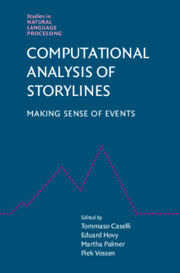Book contents
- Frontmatter
- Contents
- List of Contributors
- Introduction and Overview
- Part One Foundational Components of Storylines
- Part Two Connecting the Dots: Resources, Tools, and Representations
- 7 The Richer Event Description Corpus for Event–Event Relations
- 8 Low-Resource Event Extraction via Share-and-Transfer and Remaining Challenges
- 9 Reading Certainty across Sources
- 10 Narrative Homogeneity and Heterogeneity in Document Categories
- 11 Exploring Machine Learning Techniques for Linking Event Templates
- 12 Semantic Storytelling: From Experiments and Prototypes to a Technical Solution
- Author Index
11 - Exploring Machine Learning Techniques for Linking Event Templates
from Part Two - Connecting the Dots: Resources, Tools, and Representations
Published online by Cambridge University Press: 06 November 2021
- Frontmatter
- Contents
- List of Contributors
- Introduction and Overview
- Part One Foundational Components of Storylines
- Part Two Connecting the Dots: Resources, Tools, and Representations
- 7 The Richer Event Description Corpus for Event–Event Relations
- 8 Low-Resource Event Extraction via Share-and-Transfer and Remaining Challenges
- 9 Reading Certainty across Sources
- 10 Narrative Homogeneity and Heterogeneity in Document Categories
- 11 Exploring Machine Learning Techniques for Linking Event Templates
- 12 Semantic Storytelling: From Experiments and Prototypes to a Technical Solution
- Author Index
Summary
Traditional event detection systems typically extract structured information on events by matching predefined event templates through slot filling. Automatically linking of related event templates extracted from different documents over a longer period of time is of paramount importance for analysts to facilitate situational monitoring and manage the information overload and other long-term data aggregation tasks. This chapter reports on exploring the usability of various machine learning techniques, textual, and metadata features to train classifiers for automatically linking related event templates from online news. In particular, we focus on linking security-related events, including natural and man-made disasters, social and political unrest, military actions and crimes. With the best models trained on moderate-size corpus (ca. 22,000 event pairs) that use solely textual features, one could achieve an F1 score of93.6%. This figure is further improved to 96.7% by inclusion of event metadata features, mainly thanks to the strong discriminatory power of automatically extracted geographical information related to events.
- Type
- Chapter
- Information
- Computational Analysis of StorylinesMaking Sense of Events, pp. 221 - 239Publisher: Cambridge University PressPrint publication year: 2021



